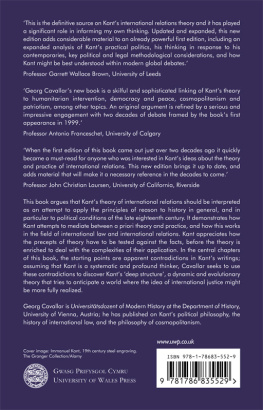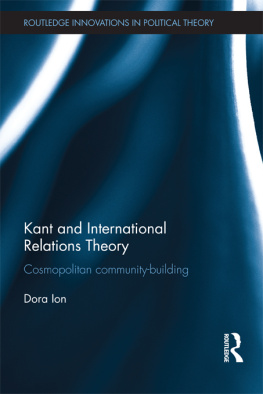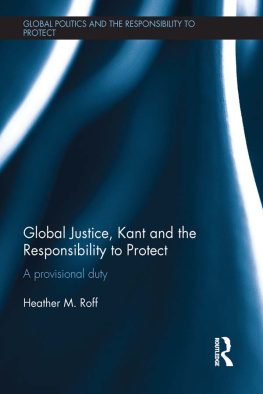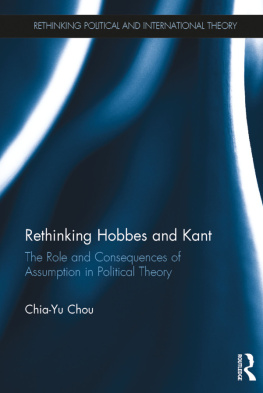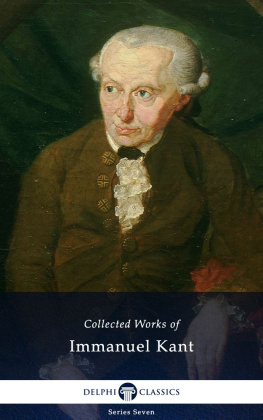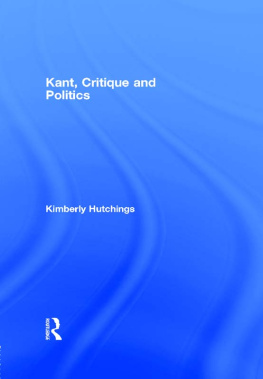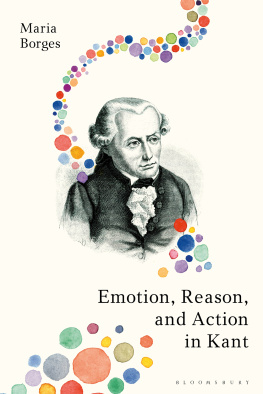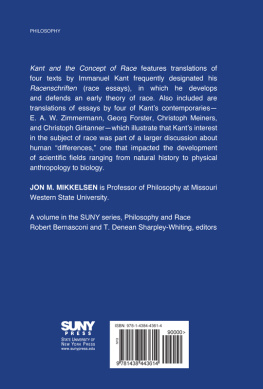Contents
POLITICAL PHILOSOPHY NOW
Chief Editor of the Series:
Howard Williams, Aberystwyth University, Wales
Associate Editors:
Wolfgang Kersting, University of Kiel, Germany
Renato Cristi, Wilfrid Laurier University, Waterloo, Canada
Susan Meld Shell, Boston College, Massachusetts, USA
David Boucher, Cardiff University, Wales
Affiliate Editors:
Peter Nicholson, University of York, England
Steven B. Smith, Yale University, USA
Political Philosophy Now is a series which deals with authors, topics and periods in political philosophy from the perspective of their relevance to current debates. The series presents a spread of subjects and points of view from various traditions which include European and New World debates in political philosophy.
Also in series
The Postsecular Political Philosophy of Jrgen Habermas
Dafydd Huw Rees
Kants Doctrine of Right in the Twenty-first Century
Edited by Larry Krasnoff, Nuria Snchez Madrid and Paula Satne
Hegel and Marx: After the Fall of Communism
David MacGregor
Politics and Teleology in Kant
Edited by Paul Formosa, Avery Goldman and Tatiana Patrone
Identity, Politics and the Novel: The Aesthetic Moment
Ian Fraser
Kant on Sublimity and Morality
Joshua Rayman
Politics and Metaphysics in Kant
Edited by Sorin Baiasu, Sami Pihlstrom and Howard Williams
Nietzsche and Napoleon: The Dionysian Conspiracy
Don Dombowsky
Nietzsche On Theognis of Megara
Renato Cristi and Oscar Velsquez
Francis Fukuyama and the end of history
Howard Williams, David Sullivan and E. Gwynn Matthews
Kants Political Legacy: Human Rights, Peace, Progress
Luigi Caranti
POLITICAL PHILOSOPHY NOW
Kant and the Theory and Practice of International Right
Georg Cavallar
Second, revised and enlarged edition

Georg Cavallar, 2020
All rights reserved. No part of this book may be reproduced in any material form (including photocopying or storing it in any medium by electronic means and whether or not transiently or incidentally to some other use of this publication) without the written permission of the copyright owner except in accordance with the provisions of the Copyright, Designs and Patents Act 1988. Applications for the copyright owners written permission to reproduce any part of this publication should be addressed to the University of Wales Press, University Registry, King Edward VII Avenue, Cardiff CF10 3NS.
www.uwp.co.uk
British Library Cataloguing-in-Publication Data
A catalogue record for this book is available from the British Library.
ISBN 978-1-78683-552-9
e-ISBN 978-1-78683-554-3
The right of Georg Cavallar to be identified as author of this work have been asserted in accordance with sections 77, 78 and 79 of the Copyright, Designs and Patents Act 1988.
The publisher has no responsibility for the persistence or accuracy of URLs for any external or third-party internet websites referred to in this book, and does not guarantee that any content on such websites is, or will remain, accurate or appropriate.
Cover image: Immanuel Kant, 19th century steel engraving. The Granger Collection/Alamy
The first edition of this book was published in 1999, when I lived in the United States for the second time. It grew out of a protracted preoccupation with what might be called Kants international relations thinking. I am indebted to Sharon Anderson-Gold, Herta Nagl-Docekal, Volker Gerhardt, John Christian Laursen, Gerhard Luf, Hans-Dieter Klein, Ingeborg Maus, August Reinisch, Alexander Somek, Howard Williams and many others who have helped me to come to terms with Kants complex philosophy. Back then, work on this book was made possible by two generous scholarships financed by the Fonds zur Frderung der wissenschaftlichen Forschung, Vienna. I finished this book when I was visiting scholar at the Department of Political Science, University of California, Riverside. After having received all this assistance, anything I have still managed to get wrong is my sole responsibility. I want to thank Sarah Lewis at UWP, and again Howard Williams for helping me to get this second edition published. The book is dedicated to my wife Angelika and our three thriving children, who still cannot understand why on earth people write books and do not get a lot of money for them.
All references to Kants works are in accordance with the Akademie-Edition, vol. 129 of Kants Gesammelte Schriften, Berlin/Leipzig, 1902. This edition is referred to by Roman (volume) and Arabic (subvolume, pages and lines) numbers. Thus, XXVII, 2, 1, 673, 38674, 2 refers to volume 27, subvolume 2, 1, page 673, line 38 to page 674, line 2. The English translations are from Hans Reiss (ed.), Kant, Political Writings (Cambridge: Cambridge University Press, 1991). For the parts not covered by Reisss edition, I use the Cambridge Edition of the Works of Immanuel Kant (New York: Cambridge University Press, 1992). References to the Critique of Pure Reason follow the customary pagination of the first (A) and second (B) edition.
Vienna and St Gilgen
Summer 2019
Acknowledgement is due for the following: A different version of Kants Judgement on Fredericks enlightened absolutism was first published in History of Political Thought, 14 (1993), 10332. was published under the title Jrgen Habermas and Manfred Riedel: Moving beyond Nationalism, in Howard Williams, Colin Wight, and Norbert Kapferer (eds), Political Thought and German Reunification (Houndmills: Macmillan Press, 2000), pp. 17793. I am grateful to all publishers for their generous permission to reprint the texts.
Virtue itself turns vice being misapplied.
Shakespeare, Romeo and Juliet
This book argues that Kants so-called theory of international relations can and should be read as Kants attempt to apply the a priori principles of reason to a particular, historical situation, especially to the political conditions of the late eighteenth century. Conservative philosophers like Friedrich von Gentz (17641832) and August Wilhelm Rehberg (17571836) had criticized Kantian political philosophy for its alleged idealism and impracticability in the 1790s. Gentz turned away from Kant after he had translated Burkes Reflections on the Revolution in France into German. He thought that Kants a priori doctrine of human rights was just preliminary work. If anyone wanted to realize this theory, the means to do so had to be studied as well. A new theory based on experience should study human beings, their passions and talents, social conditions and history in order to find out which constitution was the best for a certain people. For Gentz, Kants theory was insufficient and incomplete.
Kant was familiar with this explicit criticism of his theory, and developed his political philosophy in his later writings as a link between the pure doctrine of right and the real world. According to Kant, experience is systematically subordinated to the precepts of theory. However, experience has an important function as it helps us to learn how theory could be better and more generally put to work, after one has adopted it into ones principles (VIII, 289, 14). Some interpreters have become aware of this major aspect in Kants thinking, among them Wolfgang Kersting, Reinhard Brandt, Ingeborg Maus, Volker Gerhardt, Arthur Ripstein, Reidar Maliks, Francis Cheneval, Elisabeth Ellis, Pauline Kleingeld, Howard Williams, Sharon Byrd and Joachim Hruschka. Citizens create with their rational discourse (based on publicity) a unity beyond the sphere of transcendental consciousness. Kant asserted a harmony between right and the ends of the public with his affirmative principle of public right. If maxims, he claimed, can attain their end only through publicity, they must conform to the universal end of the public (happiness), and to be in accord with this (to make the public satisfied with its condition) is the proper task of politics (VIII, 386). This intended harmony seems strange because it is usually assumed that the wide gap in Kants philosophy between the sphere of transcendental right and the world of happiness and the needs of real people cannot be bridged. Many interpreters tend to reject passages as inconsistent or contradictory that do not fit into this picture of Kants philosophy. In this book, I argue for a profound revision of this very picture.

